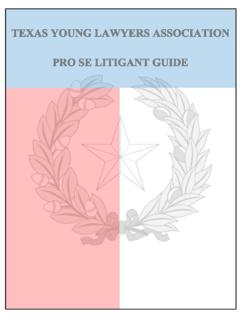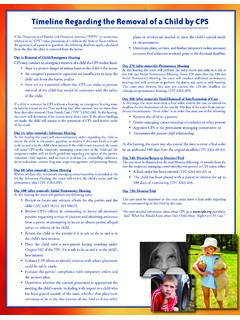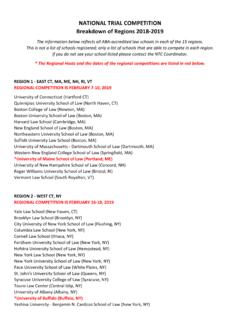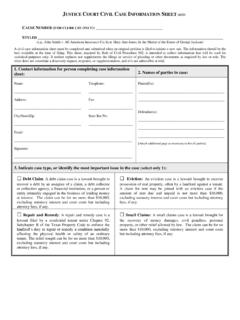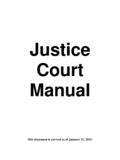Transcription of HOW TO SUE IN JUSTICE COURT - HOME - TYLA
1 TEXAS YOUNG LAWYERS ASSOCIATION. AND STATE BAR OF TEXAS. H O W T O S U E I N. JUSTICE . C O U RT. H O W T O S U E I N. JUSTICE . C O U RT. Prepared and distributed as a public service by the Texas Young Lawyers Association and the State Bar of Texas This handbook is not a substitute for the advice of a lawyer and is intended for general information concerning how to sue in small claims COURT . Originally published 1980. 2000, 2003, 2006, 2008, 2009, 2012, 2013. Texas Young Lawyers Association TABLE OF CONTENTS. What is JUSTICE COURT ?.. 1. What type of case can be brought in JUSTICE COURT ? .. 1. Who can sue in JUSTICE COURT ? .. 3. Are there alternatives to JUSTICE COURT ? .. 3. Should you check with a lawyer? .. 6. Whom do you sue? .. 7. Where do you file suit? .. 8. Have you waited too long to file suit? .. 9. How do you file suit? .. 9. How do you prepare your case?.. 12. What if you are sued? .. 15. What happens at the trial?.. 15. Mediating your case.
2 16. Choosing a jury.. 17. Presenting your case.. 18. Deciding your case.. 20. What if I am unhappy with the decision? .. 20. What do I do after I win? .. 21. Is JUSTICE COURT right for you? .. 23. Important dates to remember.. 24. Web Resources .. 25. Appendix Sample Notice Letter.. 26. Appendix JUSTICE COURT Civil Case Information Sheet.. 28. WHAT IS JUSTICE COURT ? Small claims COURT was known as the People's COURT and on August 31, 2013 it was abolished by the Texas Legislature. This does not mean you can no longer file your small claims case. Instead, you will file your small claims case in JUSTICE COURT . The Legislature created a specific set of rules for JUSTICE COURT that attempt to make it even easier for a non-lawyers to represent themselves. Small claims COURT provided an informal, uncomplicated place to resolve disputes that do not involve enough money to warrant the expense of formal litigation. Most people who appeared in small claims COURT did not have a lawyer but represented themselves.
3 These same principals apply in JUSTICE COURT . In JUSTICE COURT , the most you can recover is $10,000, including any attorney fees. If someone owes you money, and you cannot obtain payment, do not try to take the law into your own hands. Do not start a fight. If you cannot resolve the problem any other way, you may settle your differences by taking them to COURT . WHAT TYPE OF CASE CAN BE BROUGHT. IN JUSTICE COURT ? Not all disputes can be heard in JUSTICE COURT . JUSTICE COURT cannot hear disputes involving a claim for more than $10,000. No matter how important the case is to you, and no matter whether you con- vince the judge that you deserve to recover more, the judge in JUSTICE COURT cannot rule on a dispute for more than $10,000. This amount includes any attorney's fees but does not include COURT costs and 1. statutory interest. If you wish to recover more than $10,000 you must consider filing suit in another COURT with the assistance of an attorney.
4 If your case is worth more than $10,000, you cannot agree to recover less, just to sue in JUSTICE COURT . JUSTICE COURT can award only money. It cannot order a mechanic to repair your car correctly. The COURT could only award you the monetary damages you suffered because your car was not repaired the way that was promised. The COURT cannot order a store to deliver the television you paid for, but never received. If you need an order to make some- one do something or to stop doing something, other courts are available. If you win in JUSTICE COURT , you can win only a judgment for money. Some examples of common types of disputes in JUSTICE COURT are: 1. You lend money to a friend, and now he refuses to pay you. 2. More than a month has passed since you moved from your apartment. You satisfied all the conditions of your lease and provided your correct forwarding address in writing when you moved. Now the landlord refuses to return your security deposit and will not provide you a statement of what they have done with your deposit.
5 3. You have your car repaired. After the car is returned, you discover that you have been charged for repairs that were not made. 4. A credit card company has sued you to recover an unpaid debt on the account. 2. WHO CAN SUE IN JUSTICE COURT ? Any person over 18 years old can sue in JUSTICE COURT . A minor can use the COURT by having a parent, relative, or next friend who is over 18 years old accompany him to file a claim and attend the trial. The COURT may allow an individual representing himself to be assisted in COURT by a family member or another person who is not receiving compensation. An association, partnership, limited liability company, or corporation may also file a claim in JUSTICE COURT . Unlike other courts, a legal entity like a corporation does not need an attorney to file a claim in JUSTICE COURT . A corporation may appear in JUSTICE COURT through an employee or officer, even if the person is not a lawyer. A person or corporation may be represented by an attorney.
6 Some entities, however, may not use JUSTICE COURT . Banks and other institutions that are in the business of lending money for interest cannot sue in JUSTICE COURT . A collection agency also cannot sue in JUSTICE COURT . But if you have a claim against a bank or a collection agency, you can file suit against them in JUSTICE COURT . ARE THERE ALTERNATIVES TO. JUSTICE COURT ? You should always try to settle a dispute with- out suing. Many cases are filed in JUSTICE COURT that could have been resolved without a lawsuit. If you file a 3. lawsuit, you will find that you must spend time preparing your case. You will also have to pay certain fees to have your case processed. A trial in JUSTICE COURT , although informal, can be a time-consuming and emotionally draining experience. In many cases, there are alternatives to going to COURT . In a dispute with your landlord, you may be able to resolve the matter through your apartment association. In a dispute with a business, the Better Business Bureau may be helpful.
7 The Dry Cleaners Association may be able to resolve a problem with your dry cleaner. In a dispute over wages or involv- ing deceptive trade practices, a call to the attorney general's office may be worthwhile. Sometimes a local television station or newspaper will have a consumer action department. Occasionally, such departments are extremely effective in recovering money for con- sumers and are sometimes successful in recovering money where a suit in JUSTICE COURT would fail. Many cities also have neighborhood dispute resolu- tion centers that may help you resolve your dispute without a lawsuit. These steps may help you settle a dispute without going to COURT : 1. First, carefully analyze the nature and cost of the wrong and determine how much you have been damaged. How much money would it take to make you whole that is, how much money would it take to put you in the position where you would have been had the other party done what he or she promised to do?
8 For example, if the laundry has ruined a piece of your clothing, estimate the value of the article ruined. 4. 2. Once you know what you want, call the store or the person whom you feel is responsible. Speak to a person in authority, not a salesper- son. Generally, a store manager or an officer with authority to make decisions is best. 3. Calmly explain your side of the story and how you feel you were wronged. NEVER. become abusive or upset. A calm and logical approach will accomplish far more than raised voices and outrage. Yelling and shout- ing will not increase the amount that you are entitled to recover and will only create hard feelings. Be assertive, not aggressive. 4. Demand something specific. Ask the store or person to replace the garment, return your money, or some other specific compensation. Tell them exactly what you want to resolve the issue. 5. If the store manager or person in charge is unresponsive, or if you are unable to reach him by telephone, then write a letter explaining your complaint.
9 Send the letter by certified mail, return receipt requested. Remember to keep a copy of the letter and the signed return receipt. Be sure you mail the letter to the correct address. The letter should be clear and concise. There is no need for long-winded discussions or fancy legal language. There is a sample letter at the end of this pamphlet. 6. If the phone call or letter is unsuccessful at resolving the dispute, and you have tried everything else within reason, you should seriously consider filing suit. 5. SHOULD YOU CHECK WITH A LAWYER? If your attempts to settle the dispute are unsuccessful, you should determine whether or not you need an attorney. If the amount involved is significant, or if you are not comfortable representing yourself, the assis- tance of an attorney may be a good idea. In other cases, you should be able to competently represent yourself in JUSTICE COURT . Remember, this really is the People's COURT .. In some cases, you will be entitled by law to recover attorney's fees.
10 In those cases, you may be able to hire a lawyer to represent you and charge you a contingency fee; that is, charge you a fee only if you win. This can open up other courts to you which otherwise you may not be able to use effectively without a lawyer representing you. Even in JUSTICE COURT , a lawyer can often increase your chance of winning or advise you of opportunities to collect additional damages. For example, in certain con- sumer and landlord tenant disputes you can recover three times your damages. An attorney may be able to advise you about these laws or refer you to other publications, such as the Texas Young Lawyers Association Tenants' Rights Handbook, that can help you understand your rights. To find out more about available booklets call the State Bar of Texas at 1-800- 204-2222, ext. 1800, or visit To find an attorney to assist you, talk with relatives and friends to see who they recommend. You may want to contact local referral services or call the State Bar of Texas lawyer referral service at 1-877-9 TEXBAR (1-877-983-9227).
